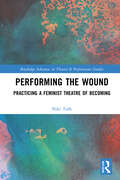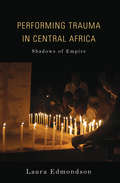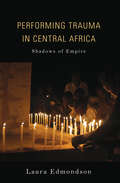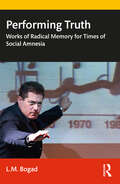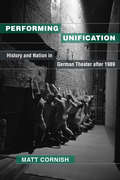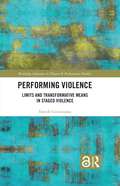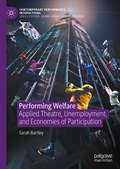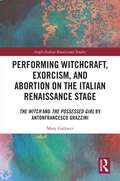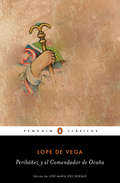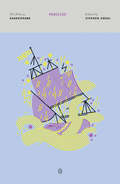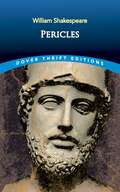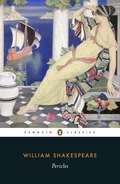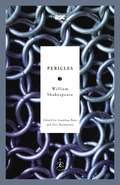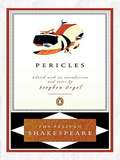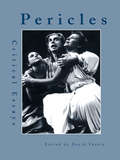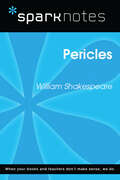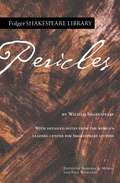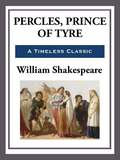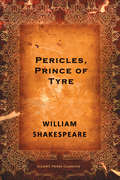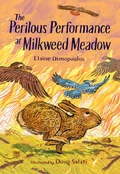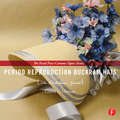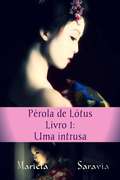- Table View
- List View
Performing the Wound: Practicing a Feminist Theatre of Becoming (Routledge Advances in Theatre & Performance Studies)
by Niki TulkThis book offers a matrixial, feminist-centered analysis of trauma and performance, through examining the work of three artists: Ann Hamilton, Renée Green, and Cecilia Vicuña. Each artist engages in a multi-media, or “combination” performance practice; this includes the use of site, embodied performance, material elements, film, and writing. Each case study involves traumatic content, including the legacy of slavery, child sexual abuse and environmental degradation; each artist constructs an aesthetic milieu that invites rather than immerses—this allows an audience to have agency, as well as multiple pathways into their engagement with the art. The author Niki Tulk suggests that these works facilitate an audience-performance relationship based on the concept of ethical witnessing/wit(h)nessing, in which viewers are not positioned as voyeurs, nor made to risk re-traumatization by being forced to view traumatic events re-played on stage. This approach also allows agency to the art itself, in that an ethical space is created where the art is not objectified or looked at—but joined with. Foundational to this investigation are the writings of Bracha L. Ettinger, Jill Bennett and Diana Taylor—particularly Ettinger’s concepts of the matrixial, carriance and border-linking. These artists and scholars present a capacity to expand and articulate answers to questions regarding how to make performance that remains compelling and truthful to the trauma experience, but not re-traumatizing. This study will be of great interest to students and scholars of performance studies, art history, visual arts, feminist studies, theatre, film, performance art, postcolonialism, rhetoric and writing.
Performing Trauma in Central Africa: Shadows of Empire (African Expressive Cultures)
by Laura EdmondsonWhat are the stakes of performance in a time of war? How is artistic expression prone to manipulation by the state and international humanitarian organizations? From the standpoint of empire, Laura Edmondson explores cultural production that responds to the 1994 genocide in Rwanda, the twenty-year civil war in northern Uganda, and regional conflict in the eastern part of the Democratic Republic of the Congo. She examines memorial ceremonies, plays, indigenous performance, NGO media campaigns, and contemporary dance to reveal how artists and cultural workers challenge state and humanitarian narratives in the shadow of empire and how empire, in turn, infiltrates creative capacities. Carefully contextualizing these narratives within the charged political terrain of the Great Lakes Region, Edmondson deepens our understanding of the role of creative expression and cultural agency in conflict and postconflict zones.
Performing Trauma in Central Africa: Shadows of Empire (African Expressive Cultures)
by Laura Edmondson“An outstanding addition to the literature on theatre and performance in situations of conflict and post-conflict.” —New Theatre QuarterlyWhat are the stakes of cultural production in a time of war? How is artistic expression prone to manipulation by the state and international humanitarian organizations? In the charged political terrain of post-genocide Rwanda, post-civil war Uganda, and recent violence in the Democratic Republic of Congo, Laura Edmondson explores performance through the lens of empire.Instead of celebrating theatre productions as expression of cultural agency and resilience, Edmondson traces their humanitarian imperatives to a place where global narratives of violence take precedence over local traditions and audiences. Working at the intersection of performance and trauma, Edmondson reveals how artists and cultural workers manipulate narratives in the shadow of empire and how empire, in turn, infiltrates creative capacities.
Performing Truth: Works of Radical Memory for Times of Social Amnesia
by L.M. BogadPerforming Truth answers the most pressing questions facing any theatre-makers who are wrestling with how to present historical, political or socioeconomic information in an engaging, entertaining, and galvanizing way. How to make data compelling and documents mobilizing? How to keep an audience interested in what might be dry, dire, or depressing? How to surprise an audience and keep them alert? Collecting together the performance texts of international performance artist and activist L.M. Bogad, this book accompanies each script with essays that further explore that work's performance strategies. It also equips readers with specific resources and pedagogical tools to help those wishing to stage these pieces or create their own work to engage with similar topics. Bogad also provides "takeaways" for each piece, illustrating the challenges of its particular subject matter and how to overcome those challenges with innovations unique to performance art. This is a key guidebook for artists and theatre-makers facing the challenges of engaging with information in an era of fake news, propaganda bots, and the polarization of ideological spheres, as well as students and teachers taking on that challenge in theatre studies, performance studies and performing arts classrooms.
Performing Unification: History and Nation in German Theater after 1989
by Matt CornishSince the moment after the fall of the Berlin Wall in 1989, the most important German theater artists have created plays and productions about unification. Some have challenged how German history is written, while others opposed the very act of storytelling. Performing Unification examines how German directors, playwrights, and theater groups including Heiner Müller, Frank Castorf, and Rimini Protokoll have represented and misrepresented the past, confronting their nation’s history and collective identity. While scholars and critics have scrutinized unification in cinema and literature, this is the first book to focus on theater and performance. Author Matt Cornish surveys German-language history plays from the Baroque period through Friedrich Schiller, Heinrich von Kleist, Brecht, and up to the documentary theater movement of the 1960s to show how German identity has always been contested, even well before Germany became a nation. Then turning to performances of unification after 1989, Cornish argues that theater, in its structures and its live gestures, on pages, stages, and streets, helps us to understand the past and its effect on us, our relationships with others in our communities, and our futures. Engaging with theater theory from Aristotle through Bertolt Brecht and Hans-Thies Lehmann’s “postdramatic” theater, and also with theories of history from Hegel to Walter Benjamin and Hayden White, Performing Unification demonstrates that historiography and dramaturgy are intertwined.
Performing Violence: Limits and Transformative Means in Staged Violence (Routledge Advances in Theatre & Performance Studies)
by Davide GiovanzanaThis book offers an exhaustive approach to all forms of staged violence and an in-depth analysis of their emergence and repercussions (dramaturgically and physically).This study explores instruments to surpass the dichotomic opposition victim-oppressor, to demystify the spell of violence, and to get rid of the morbid voyeurism often connected to staged violence, and eventually, it proposes transformative tools to explore empowering experiences through violence. Considering all the aspects of a theatre performance engaging with staged violence (the story displaying violence, the actors’ embodiment of violence, the spectators’ experiences of being exposed to violence, and the process of performing violence), this book proposes analytical and practical tools to explore the limit and to transform the experience of performing violence.This book will be of great interest to students and scholars in theatre and performance studies.
Performing Welfare: Applied Theatre, Unemployment, and Economies of Participation (Contemporary Performance InterActions)
by Sarah BartleyThis book explores what happens to socially committed performance when state systems of social security are dismantled. Since 2010, a punishing programme of economic austerity and a seismic overhaul of the Welfare State in the United Kingdom has been accompanied by an ideological assault on dependency; a pervasive scapegoating of the poor, young, and disabled; and an intensification of the discursive relationship between morality and work. This book considers the artistic, material, and ideological consequences of such shifts for applied and socially engaged performance. Performing Welfare reveals how such arts practices might reconstitute notions of work and labour in socially constructive ways. It focuses on the political potential of participation during a period in which classifications of labour and productivity are intensely contested. It examines the migration of discourses from state policy to the cultural sector; narratives of community and aesthetics of dependency; the paradoxes of visibility in creative projects with stigmatised participants; the implicit relationship of participatory performance to neoliberal productivity; and, the parallels between gendered divisions of labour, social reproduction, and applied performance. It will appeal to students, scholars, and practitioners interested in applied and socially engaged performance, participation, community, representation, the welfare state, social policy, labour, and unemployment.
Performing Witchcraft, Exorcism, and Abortion on the Italian Renaissance Stage: The Witch and The Possessed Girl by Antonfrancesco Grazzini (Anglo-Italian Renaissance Studies)
by Mary GallucciAntonfrancesco Grazzini’s plays, La Spiritata (The Possessed Girl) and La Strega (The Witch), are available in English for the first time, with notes and an “Introduction.” These plays deal with witchcraft, superstition, sexuality, and abortion. The context for such themes is analyzed in the “Introduction.” Grazzini enhanced literary drama with elements from popular performances. He influenced other playwrights, including in England, where The Possessed Girl was adapted as the Elizabethan comedy, The Bugbears. Writer and linguist John Florio used Grazzini’s plays in his lexicon of Italian for English learners. Grazzini celebrated artistic and popular traditions of Renaissance Florence; he is significant for writing and preserving many literary genres, especially the burlesque and carnivalesque. He participated in Florentine spectacle and theater, as a writer of plays, a composer of interludes, and a chronicler of festive events. His importance to the development of the Italian language is evident in his plays.
Peribáñez y el Comendador de Ocaña (Los mejores clásicos #Volumen)
by Lope de VegaLos mejores libros jamás escritos Edición de José María Díez Borque, Catedrático de Literatura Española de la Universidad Complutense de Madrid Peribáñez y el Comendador de Ocaña reúne todas las cualidades que hicieron de Lope de Vega una de las grandes figuras de la literatura europea. El rechazo de los preceptos de la poética aristotélica, la concepción del teatro como entretenimiento y el conocimiento preciso de los mecanismos del drama alcanzan aquí su muestra más ajustada e intensa. Estas son algunas de las razones por las que no es solo recomendable para adentrarse en la obra de Lope de Vega, sino también en el teatro español del Siglo de Oro. Esta edición incluye una introducción que contextualiza la obra, un aparato de notas, una cronología y una bibliografía esencial, así como también varias propuestas de discusión y debate en torno a la lectura. Está al cuidado de José María Díez Borque, catedrático de literatura española de la Universidad Complutense de Madrid. «Exceso es ya tan gran desconfianza, porque ninguno amó sin esperanza.»
Pericles: With The Story Of The Prince Of Tyre... . (The Pelican Shakespeare)
by William ShakespeareThe acclaimed Pelican Shakespeare series edited by A. R. Braunmuller and Stephen Orgel The legendary Pelican Shakespeare series features authoritative and meticulously researched texts paired with scholarship by renowned Shakespeareans. Each book includes an essay on the theatrical world of Shakespeare’s time, an introduction to the individual play, and a detailed note on the text used. Updated by general editors Stephen Orgel and A. R. Braunmuller, these easy-to-read editions incorporate over thirty years of Shakespeare scholarship undertaken since the original series, edited by Alfred Harbage, appeared between 1956 and 1967. With definitive texts and illuminating essays, the Pelican Shakespeare will remain a valued resource for students, teachers, and theater professionals for many years to come. For more than seventy years, Penguin has been the leading publisher of classic literature in the English-speaking world. With more than 1,700 titles, Penguin Classics represents a global bookshelf of the best works throughout history and across genres and disciplines. Readers trust the series to provide authoritative texts enhanced by introductions and notes by distinguished scholars and contemporary authors, as well as up-to-date translations by award-winning translators.
Pericles: With The Story Of The Prince Of Tyre... . (Dover Thrift Editions)
by William ShakespeareThis romantic drama portrays the travails of a wandering prince and the redemptive powers of a daughter's love. Driven from one end of the Mediterranean to another by the winds of fate, Pericles endures loss and heartbreak before his odyssey ends in a miraculous reunion. Shipwreck, famine, and other disasters punctuate this wondrous tale, in which a knight in rusty armor fights for his true love and a princess kidnapped by pirates retains her honor by setting a virtuous example for her captors.Prologues delivered in the character of medieval English poet John Gower introduce each act of this unusual play, whose authorship has long been disputed. Written late in Shakespeare's career, Pericles was enormously popular in the seventeenth century and was the first of the playwright's dramas to be staged after the Restoration. The play fell into neglect until recent years, and now its charms are being rediscovered by modern audiences.
Pericles
by William ShakespearePericles, Prince of Tyre, must solve a riddle in order to marry the daughter of the King of Antioch, or be put to death. But when the answer reveals a horrific secret, the young man faces his greatest dilemma. Danger and adventure follow as Pericles flees the city to find his fortune elsewhere, in a romantic drama of families lost and reunited, evil punished and virtue rewarded.
Pericles: Prince Of Tyre (Modern Library Classics)
by William Shakespeare Jonathan Bate Eric Rasmussen"This world to me is but a ceaseless storm Whirring me from my friends." --Pericles Eminent Shakespearean scholars Jonathan Bate and Eric Rasmussen provide a fresh new edition of this classic tragicomedy of good and evil in many guises. THIS VOLUME ALSO INCLUDES MORE THAN A HUNDRED PAGES OF EXCLUSIVE FEATURES: * an original Introduction to Pericles * incisive scene-by-scene synopsis and analysis with vital facts about the work * commentary on past and current productions based on interviews with leading directors, actors, and designers * photographs of key RSC productions * an overview of Shakespeare's theatrical career and chronology of his plays Ideal for students, theater professionals, and general readers, these modern and accessible editions from the Royal Shakespeare Company set a new standard in Shakespearean literature for the twenty-first century.From the Trade Paperback edition.
Pericles
by William Shakespeare Stephen Orgel"I feel that I have spent half my career with one or another Pelican Shakespeare in my back pocket. Convenience, however, is the least important aspect of the new Pelican Shakespeare series. Here is an elegant and clear text for either the study or the rehearsal room, notes where you need them and the distinguished scholarship of the general editors, Stephen Orgel and A. R. Braunmuller who understand that these are plays for performance as well as great texts for contemplation." (Patrick Stewart) The distinguished Pelican Shakespeare series, which has sold more than four million copies, is now completely revised and repackaged. Each volume features: * Authoritative, reliable texts * High quality introductions and notes * New, more readable trade trim size * An essay on the theatrical world of Shakespeare and essays on Shakespeare's life and the selection of texts
Pericles: Critical Essays (Shakespeare Criticism #Vol. 23)
by David SkeelePericles: Critical Essays brings together the most essential critical essays and theatrical reviews of Shakespeare's play from the late 17th century to the present, providing a representative gathering of critical opinion of Pericles over the centuries. David Skeele's introduction identifies the critical issues and problems the play has raised, cites and evaluates significant critical works, and gives readers a guide to research on the play.
Pericles (SparkNotes Literature Guide Series)
by SparkNotesPericles (SparkNotes Literature Guide) by William Shakespeare Making the reading experience fun! Created by Harvard students for students everywhere, SparkNotes is a new breed of study guide: smarter, better, faster. Geared to what today's students need to know, SparkNotes provides: *Chapter-by-chapter analysis *Explanations of key themes, motifs, and symbols *A review quiz and essay topicsLively and accessible, these guides are perfect for late-night studying and writing papers
Pericles
by Paul Werstine William Shakespeare Barbara MowatPericles tells of a prince who risks his life to win a princess, but discovers that she is in an incestuous relationship with her father and flees to safety. He marries another princess, but she dies giving birth to their daughter. The adventures continue from one disaster to another until the grown-up daughter pulls her father out of despair and the play moves toward a gloriously happy ending. The authoritative edition of Pericles from The Folger Shakespeare Library, the trusted and widely used Shakespeare series for students and general readers, includes: -Freshly edited text based on the best early printed version of the play -Full explanatory notes conveniently placed on pages facing the text of the play -Scene-by-scene plot summaries -A key to the play’s famous lines and phrases -An introduction to reading Shakespeare’s language -An essay by a leading Shakespeare scholar providing a modern perspective on the play -Fresh images from the Folger Shakespeare Library’s vast holdings of rare books -An annotated guide to further reading Essay by Margaret Jane Kidnie The Folger Shakespeare Library in Washington, DC, is home to the world’s largest collection of Shakespeare’s printed works, and a magnet for Shakespeare scholars from around the globe. In addition to exhibitions open to the public throughout the year, the Folger offers a full calendar of performances and programs. For more information, visit Folger.edu.
Pericles (The New Cambridge Shakespeare)
by William Shakespeare edited by Doreen DelVecchio Antony HammondOver the past two decades there has been a resurgence of theatrical interest in Shakespeare's Pericles, which has been rescued from comparative neglect and is now frequently performed. This development is charted in the introduction to this edition, which differs radically from any other currently available. Doreen DelVecchio and Antony Hammond reject the critical orthodoxies of a corrupt text and divided authorship. Instead they show the play to be a unified aesthetic experience. The result is a more enthusiatic view of Pericles than that of other editions.
Pericles, Prince of Tyre
by William ShakespearePerhaps one of Shakespeare's most adventure-filled plays, "Pericles" follows the extended sailing journeys of a young prince. Pericles is forced to flee Antioch when he correctly guesses a riddle that reveals the incestuous activity of King Antiochus. Unable to stay at home in Tyre because of Antiochus' vengeance, he sails away and ends up shipwrecked in Pentapolis, where he fights for and wins a princess named Thaisa. The trials and tribulations of this couple and their daughter Marina fill the remaining acts of "Pericles" with grief and trepidation, as well as joy and a truly heartwarming reunion. A laudable component of Shakespeare's collection of plays, "Pericles, Prince of Tyre" is a compelling story of family and struggle that resonates with readers even today.
Pericles, Prince of Tyre
by William ShakespeareAfter Prince Pericles puzzles out a terrible secret about the king of Antioch, he flees the city and sets sail on his ship. His adventures bring him love and marriage, but his greatest tragedies and triumps lay ahead as he voyages home.
Perilous Passions: Ethics and Emotion in Early Modern Spain (Toronto Iberic #87)
by Hilaire KallendorfCan feelings be wrong? Scientists agree that emotions contain both a cognitive and a physiological component. The cognitive part can be modified, while the physiological response is largely involuntary. In religious terms, the answer is clear in its legislation of heart motives: love your enemies, lust is equivalent to adultery, hate is the same thing as murder. In Perilous Passions, Hilaire Kallendorf draws on early modern Spanish theatre to reveal how emotions have always been understood as central to ethics. Starting with a treatise on emotion, On the Passions of the Soul by Juan Luis Vives (1493–1540), Kallendorf uses pairs of opposing emotions – love/hatred, desire/aversion, joy/sorrow, hope/despair, and courage/fear – to explore how they are depicted in Golden Age plays. The book pinpoints and probes intersections of feelings with morality. It asks: Do emotions bear positive or negative ethical overtones? Which emotions are more conducive to virtue? Are passions perceived as perilous in early modern Spain, in agreement with Neostoic principles? Or does the Catholic liturgy’s emphasis on involving the corporeal senses in worship mean that bodily sensations, including feelings, are accorded pride of place – especially in drama? In asking these questions, Perilous Passions argues for the significance of theatre in emotional education.
The Perilous Performance at Milkweed Meadow
by Elaine DimopoulosButternut and the meadow creatures return in this middle-grade adventure sequel that will charm animal-loving fans of The Tale of Despereaux and Clarice the Brave. Illustrated by Caldecott winner Doug Salati.After their remarkable rescue, the meadow creatures are back—now closer than ever and with beloved rabbit Butternut still captivating them all with her storytelling. But when a dazzling group of traveling turkeys shows up and persuades the meadow creatures to join them in putting on performance, Butternut is not sure she can find her place in all the excitement. She questions her storytelling abilities compared to this new crew.When it turns out the turkeys—and the grand show—are not what they seem, Butternut's family and friends are suddenly in imminent danger. Butternut must figure out how to trust herself and find help. In the end, the hope is that friendship will win once more.Beautiful and arresting black-and-white illustrations bring the animals to life in this nail-biting and heartwarming story about trust: trusting our instincts, trusting our creative talents, and trusting those who know and love us, even when it&’s hard.&“Treasured classics designed to be read aloud and shared.&”—Caroline Carlson, author of Wicked Marigold
Period Reproduction Buckram Hats: The Costumer’s Guide (The Focal Press Costume Topics Series)
by Crystal G. HermanWhether you’re in a professional or a community theatre, part of a historical re-enactment, or teaching costume construction, a well-made hat provides a much-needed finishing touch to a costume. Period Reproduction Buckram Hats: The Costumer’s Guidebook is your one-stop resource for learning how to recreate historically accurate buckram hats. Each chapter is devoted to the construction of a particular hat, beginning with a historical image and followed by an list of the exact amount of fabric, tools, and materials needed and the estimated time to complete the construction. Every chapter contains a brief historical background on each hat, a pattern, step-by-step instructions, process photographs, and ideas for altering the pattern to fit your unique production. This book not only provides instruction for the exacting reproduction of historic hats, but it also guides and encourages you to alter patterns and techniques to create your own designs. The final chapters outline general millinery principles that can be applied to almost any hat, allowing you to customize your project.
Pérola de Lótus: Uma intrusa
by Ana Paula Ruth Lima Mariela SaraviaIshi é uma menina de treze anos, que vê o mundo de uma forma bem particular, vive fechada em sua cabana sob a custódia de sua família. Num descuido, conhece Tian e com ele descobre o primeiro amor junto com um novo mundo, longe dos maus tratos que vive em sua casa. Meses mais tarde, ante de estourar a Guerra do Ópio, seus pais tem a possibilidade de vendê-la a um mercador inglês, quem decide pagá-la como seu maior patrimônio. A chegada de Ishi em Londres será desajeitada e angustiosa. Aprenderá novos trabalhos com muitas dificuldades, mas também descobrirá aí a verdadeira paixão e amor nas mãos de Adolf, um jovem aristocrático de nobre coração. Contudo, o amor entre raças sempre foi um castigo para qualquer família de posse, e Ishi vai pagá-lo com desprezo. Terminada a Guerra do Ópio, Ishi deixa de se sentir parte de Londres e daquele homem que tanto ama, pois seu sangue inglês foi a maldição de seu povo oriental. Poderá o tempo reuni-los outra vez, para que se amem sem rancores?
